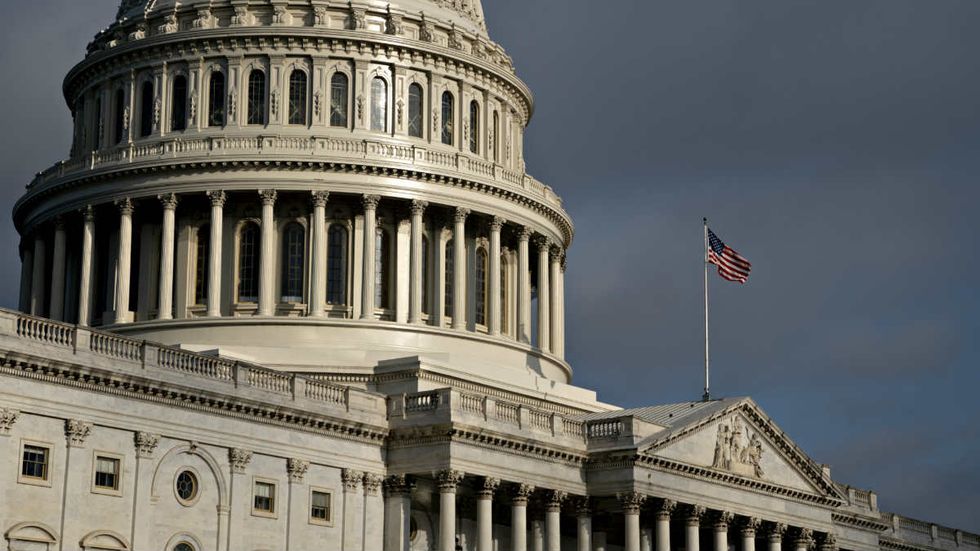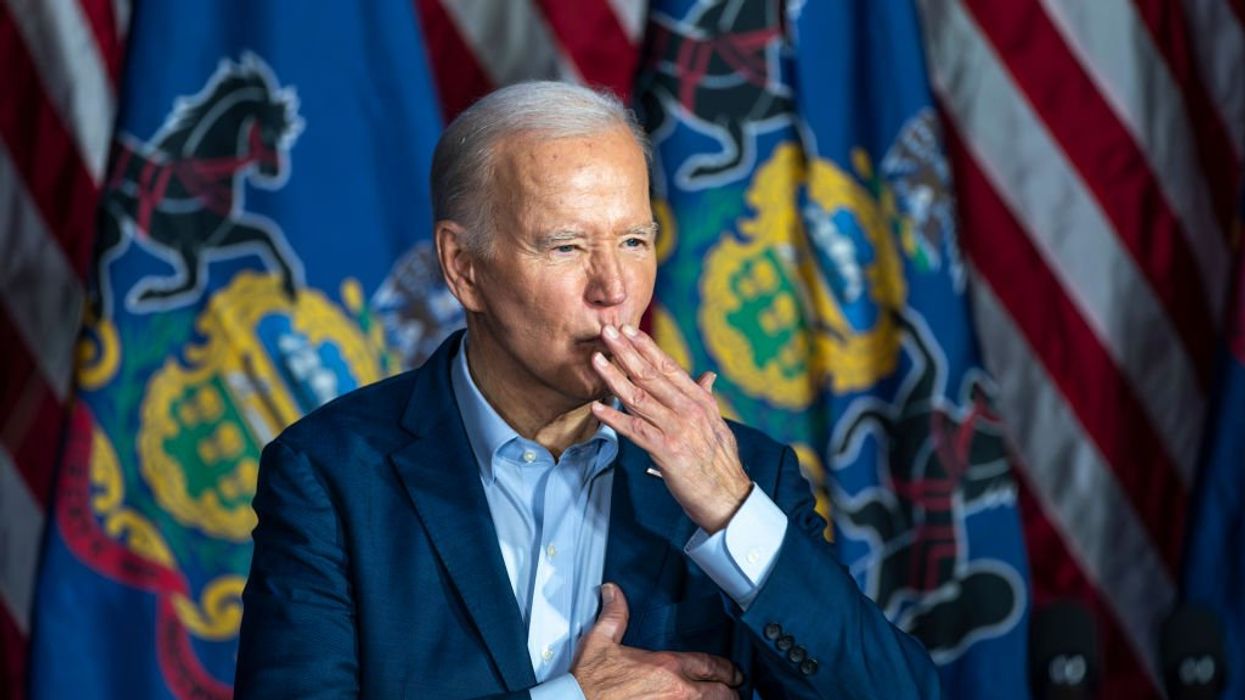
© 2024 Blaze Media LLC. All rights reserved.
Horowitz: 15 things conservatives must demand in return for coronavirus bailout package
March 18, 2020
One thing is certain: Nearly every Republican is going to join with the Democrats and the liberal elements of the administration to push numerous spending packages that could cost trillions of dollars when this is all done. They will not debate the merits of the provisions, try to better target them, or limit the cost. But conservatives should at least secure some policy victories for the American people that actually address the source of this health crisis in return for bankrupting us.
Congress already passed an $8.3 billion bill and is in the process of passing 12 weeks of tax credits for paid leave worth $105 billion, along with numerous increases in welfare programs. Democrats and Secretary Mnuchin already secured support for a third package that will bail out the airline industry among others and send $1,000 checks to every American, at a cost of $1 trillion. The administration is also asking for a discretionary spending package of $45.8 billion.
Well, if the bipartisan liberals are using this crisis to clinch their priorities, shouldn’t we at least widen the discussion to the actual policies that bring in viruses, stress our health system, and make us vulnerable to China while they are making us pay for the rope to hang ourselves?
The few remaining conservatives in Washington need to seize control of the narrative and should demand the following in return for support of the bailouts:
Immigration Policy
- A limitation on Chinese visas and foreign students until benchmarks of transparency and cooperation are met by the communist Chinese government.
- A permanent provision of law mandating the suspension of travel from source countries and secondary countries the moment our government becomes aware of the spreading of a dangerous virus.
- A permanent provision of law stating that all immigration, refugee, and asylum processing must cease when there are restrictions on movement and commerce domestically. If it’s bad enough to restrict movement of Americans domestically, it should be severe enough to suspend immigration, which is more likely to transmit global epidemics across borders. With this epidemic, it took way too long to shut that down.
- A provision addressing how China is using immigration to suck out all our research and development, a problem recognized in a recent bipartisan Senate committee report.
Maintain Order
- More funding for federal prosecutors: There is a growing epidemic of major cities ordering police to stand down and not arrest criminals or for jails and prisons to begin releasing criminals. The mix of businesses remaining vacant with criminals roaming the streets has the potential to create a second order crisis. Once we are spending endless sums anyway, we should beef up the federal prosecutors’ offices for the next few months to serve as a backstop against the local jailbreak. If we are federalizing every aspect of our lives, we as may as well have the feds contribute to maintaining order, the core job of government.
Regulatory Policy
- End ban on physician-owned hospitals: The biggest concern of our health care system, which is largely driving the push to restrict movement, is a lack of available bed space in hospitals. In general, we face a shortage in hospitals and affordable care due to the monopolies, mergers, and acquisitions of big health care conglomerates created under Obamacare. One of the most onerous, yet forgotten provisions of Obamacare was the ban on physician-owned hospitals. That provision needs to end immediately so physicians can compete with the conglomerates while extending access to care. Doing so would immediately spawn a revolution in health care and stimulate the economy.
- Make telehealth great: The Centers for Medicare and Medicaid Services have temporarily suspended regulations on telehealth as well as some of the draconian privacy restrictions under HIPAA. The laws should be changed permanently to accommodate the better use of technology and communications to expand access to health care.
- End FDA bans on private testing: Everyone is talking about how government failed to deliver workable testing kits, which could have detected the virus earlier and flattened the curve of the spread quicker. What is less known is that government banned private labs from testing them. The minute Trump suspended that regulation, we had a boon of effective testing kits sprout up throughout the health care supply chain. It’s time this and similar regulations be permanently repealed.
- End all unnecessary regulations that stifle the supply chain of vital goods and services, whether they are environmental or labor in nature. We need to keep supplies of all sorts flowing.
- Medical Supply Chain Security Act: Pass Sen. Josh Hawley’s Medical Supply Chain Security Act, which would ensure that the FDA monitors and sources shortages of ingredients and materials needed for critical medical devices and drugs, while expedited approval of those items to go to market. Hawley is right to suggest that if we are going to bail out industries, we should demand answers about where they are going to make their products.
Fiscal Policy
- Loans instead of bailouts: If we are going to bail out industries because of a lack of cash flow, then make it temporary and targeted, not permanent and indiscriminate. Ditto for small business loans from the Small Business Administration.
- Offsets: While we will obviously not pay for the entire cost, conservatives should demand at least a veneer of pay-fors. Sen. Rand Paul’s idea of cutting foreign aid makes a lot of sense when our own country is experiencing such a crisis.
- Refocus the mandate of NIH and CDC: The lead organizations dealing with public health crises have record cash, yet we are told they lack resources. Congress must reorient their mission away from fighting obesity and racism and make them strictly focused on public health management of crises that are too large for the states to deal with.
- Index capital gains taxes to inflation and temporarily suspend other income taxes: As much as possible, the focus should be on cutting taxes, not handouts. Rather than bailing out Wall Street, we should borrow an idea Sen. Ted Cruz has pushed in the past to index the capital gains tax to inflation. This will inject more capital into the market. As much as possible, we should be encouraging work for those who can or must work or who can telecommute. Let’s face it, a $1,000 or $2,000 check for every American is enough to bankrupt our Treasury but is a paltry sum if it’s designed to replace several months of lost household income. Clearly, unless we are prepared to cut $50,000 checks to every American family, we have no choice but to balance encouragement of work with social distancing. The best way to do that, once we are going to suffer revenue losses anyway, is to slash taxes. We need a live economy to actually stimulate. You can’t stimulate a nuclear winter.
- Sanction China: Finally, it’s time to divest and decouple from China. This begins by working with allies to sanction China until its government become more transparent about the source and timing of this disease. According to a study from Southampton University, there would have been a 95 percent reduction in coronavirus cases had China taken action and alerted the world three weeks earlier. Focusing a congressional response to this virus without dealing with China would be like focusing on 9/11 without studying the hijackers and al Qaeda.
Clearly, substantial sums of money will be spent in the coming weeks. But most of public policy is about finding the right policy solutions, not throwing money at a problem. If we are going to throw an unlimited amount of money at the problem, someone needs to be guarding the gates to ensure that we actually solve the policy problems and prevent this from happening in the future, while limiting the pain in the short run.
Finally, through all of this, we must remember that all the debt we pile up on top of the unfathomable debt we accrued during a time of prosperity will be owned by … China!
Want to leave a tip?
We answer to you. Help keep our content free of advertisers and big tech censorship by leaving a tip today.
Want to join the conversation?
Already a subscriber?
Blaze Podcast Host
Daniel Horowitz is the host of “Conservative Review with Daniel Horowitz” and a senior editor for Blaze News.
RMConservative
more stories
Sign up for the Blaze newsletter
By signing up, you agree to our Privacy Policy and Terms of Use, and agree to receive content that may sometimes include advertisements. You may opt out at any time.
© 2024 Blaze Media LLC. All rights reserved.
Get the stories that matter most delivered directly to your inbox.
By signing up, you agree to our Privacy Policy and Terms of Use, and agree to receive content that may sometimes include advertisements. You may opt out at any time.



